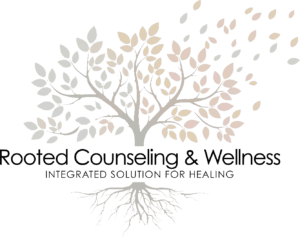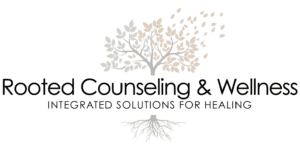ROOTED COUNSELING & WELLNESS
COUNSELING SERVICES
Rooted Counseling & Wellness offers compassionate counseling services in Draper, Utah. In our Counseling Clinic, you will find trauma-informed therapists who want to help you heal all the parts of you and help you live the life you desire.
ROOTED COUNSELING & WELLNESS
Our Treatment Philosophy
People often seek out therapy when there are life stressors, difficulties in relationships, or when struggles to manage one’s mental and emotional health become overwhelming. Although, people come to therapy for a variety of reasons, they are typically looking for:
SUPPORT • INSIGHT • SOLUTIONS
Through a collaborative therapeutic experience, we will work together to improve your emotional health & support your efforts towards other goals you may have. As you engage in therapy, you will find new and more effective ways to deal with difficult situations, emotions, & memories as you learn to shift your thinking, regulate emotions, and gain greater insight and understanding.
ROOTED COUNSELING & WELLNESS
WHAT WE TREAT
Anxiety, Panic & OCD
Read More →
Anxiety, Panic & OCD
Excessive worry, always planning for the worst case scenario, health anxiety, panic attacks, ruminating thoughts, obsessive-compulsive tendencies
Depression
Read More →
Depression
Low mood, motivation, energy, & self-esteem. Feelings of emptiness, hopelessness, & despair.
Trauma & PTSD
Read More →
Trauma & PTSD
Childhood abuse or neglect, sexual trauma, relationship trauma, accidents/injuries, traumatic loss, secondary trauma
Grief / Loss
Read More →
Grief / Loss
We can grieve anyone or anything that has been important to us – a person, relationship, community, career, and much more.
Life Transitions
Read More →
Life Transitions
Adjusting to marriage or divorce, career changes, becoming a parent or an empty nester.
Family & Parenting
Read More →
Family & Parenting
Parenting & co-parenting challenges, blending a family, or navigating challenging dynamic of adult child-parent relationship.
Relationship Problems
Read More →
Relationship Problems
Conflict & communication struggles, navigating differences, emotional & sexual intimacy, betrayal/infidelity.
Faith Journey / Transitions
Read More →
Faith Journey / Transitions
Exploring doubt, conflict, nuance, and changes in beliefs and possibly one’s religious community.
ROOTED COUNSELING & WELLNESS
TREATMENT MODALITIES
EMDR (Eye Movement Desensitization and Reprocessing) is a research-backed therapy that helps people heal from trauma by targeting how distressing memories are stored in the brain. Unlike traditional talk therapy, EMDR uses bilateral stimulation—like eye movements or tapping—to help the brain reprocess painful experiences, reducing emotional charge and shifting how the memory is held. At Rooted, EMDR is often integrated with attachment work and other trauma-informed approaches (like IFS) to support deep, lasting healing.
Who can benefit from EMDR: EMDR is for individuals where distressing memories, emotions, and body-sensations disrupt how they function from day to day. If you struggle with symptoms of anxiety, panic, PTSD, chronic shame, limiting beliefs (i.e. “I’m not good enough” or “I can’t trust anyone”), EMDR can help the brain reprocess stuck experiences and create more adaptive beliefs about the trauma so they no longer feel overwhelmed.
Acceptance and Commitment Therapy (ACT) is a mindfulness-based approach that is based on the idea that distressing emotions (anxiety, depression, anger, sadness, etc.) are a part of life and by attempting to control them, you are actually creating MORE unpleasant emotions. As you learn skills to help you better accept and tolerate difficult emotions, rather than fighting against or avoiding them, you can live a full and meaningful life when you make decisions and act based on what’s most important to.
Who can benefit from Acceptance & Commitment Therapy (ACT): If you’re looking for tools to help management anxiety, depression, chronic pain, perfectionism, burnout, even trauma and PTSD – without diving into the past, Acceptance and Commitment Therapy can be a great approach.
So much of what we do, feel, and react to in the present is influenced by unconscious patterns formed in childhood. We work from an attachment-based and psychodynamic framework, often exploring early relational experiences, unmet attachment needs, relational trauma, and core beliefs and emotional regulation in effort to create healthier relationships with self and others.
With adolescent clients, parent-child sessions are offered as needed to strengthen connection and communication. We also provide couples therapy, family therapy, and parenting consultations, which can be integrated alongside individual therapy to support the broader relational system.
Who can benefit from Attachment-Based Interventions: Those who struggle with trust, vulnerability, chronic shame, and feelings of insecurity. Those who find that their attachment style is interfering with healthy connections.
Emotionally Focused Therapy (EFT) is a structured, evidence-based approach to couples and individual therapy that focuses on strengthening emotional bonds and creating secure, resilient relationships. Rooted in attachment theory, EFT helps people identify and shift negative interaction patterns, express vulnerable emotions, and build deeper emotional connection by learning to respond to unmet attachment needs and fears.
Who is EFT for: Couples who experience emotional disconnect, frequent conflict or communication breakdowns, loneliness, betrayal, or where one or both partners’ attachment history is impacting the present day relationships. Anyone seeking to create a greater ability to feel seen, safe, and emotionally connected in their relationships.
In a walk-and-talk session, therapy takes place outdoors—usually along a quiet trail or path—while you and your therapist walk side by side. The natural setting and rhythm of walking can help regulate the nervous system and create space for more meaningful reflection and deeper insight. Being in the outdoor environment brings added benefits of fresh air, gentle movement, and opportunities for grounding and nature-based metaphors —like noticing how growth happens slowly, or how we navigate around obstacles in the path. Walk-and-talk sessions are ideal for those who feel more at ease in nature or who find clarity through movement and environment.
Who can benefit from Walk & Talk sessions: This is a great option for those who feel stuck in traditional talk therapy, feel uncomfortable sitting in face-to-face conversations, or who connect more easily through movement and environment.
Dialectical Behavior Therapy (DBT) is a skills-based therapy designed to help people manage intense emotions, build healthier relationships, and reduce self-destructive behaviors. DBT offers practical, structured tools for building stability, self-awareness, and resilience—making it a strong fit for teens and adults who feel overwhelmed by emotion or relationships.
Who can benefit from DBT: DBT offers practical, structured tools for building stability, self-awareness, and resilience—making it a strong fit for teens and adults who feel overwhelmed by emotion, experience impulsivity, engage in self-harming or suicidal behaviors, or struggle in relationships.
Experiential Therapy uses creative techniques to help clients access and process emotions and experiences. Methods may include Expressive Arts (drawing, painting,music, poetry), recreation, role-playing or psychodrama, and Sand Tray therapy—where clients use sand and miniatures to represent their inner world, which is then explored with the therapist.
Who can benefit from Experiential Therapy: It’s especially helpful for those who feel overwhelmed by traditional talk therapy, as it offers symbolic and expressive ways to explore emotions.
Accelerated Resolution Therapy (ART) is an evidenced based therapy for the treatment of trauma, anxiety, depression, phobias, and more. Similar to EMDR, ART uses bilateral stimulation (such as eye movements) and a protocol to reprocess past experience. What sets ART apart from other therapies is the clinician’s ability to assist you in replacing distressing images with empowering and positive imagery while releasing the negative emotions affiliated with the event(s), often alleviating symptoms and achieving “resolution” in as little as one session.
Who is Accelerated Resolution Therapy for: ART is especially helpful for those who have experienced single incident traumas (like a sexual assault or car crash), panic or phobias, relationship pain/infidelity, or complicated grief. ART is also a frequently used approach with first responders and those who have served in the military.
Internal Family Systems (IFS) is particularly effective in addressing trauma because it helps individuals heal by fostering a compassionate relationship with the parts of themselves that carry traumatic memories and painful emotions.
In the IFS model, trauma often results in the formation of specific protector parts that hold painful or traumatic experiences. This approach helps create a safe and non-judgmental internal environment for these parts and individuals are encouraged to connect with their Self, a core aspect of themselves that is calm, curious, and compassionate. The Self is seen as a leader that can guide the healing process as trust and communication are fostered between these parts and the Self. IFS helps people explore and heal the different “parts” of themselves—like the anxious part, the angry part, the people-pleaser, or the inner critic—while reconnecting to their calm, grounded core Self.
**Other types of part work therapists at Rooted Counseling & Wellness may practice include Ego States, inner child work, and shadow work.
Who is IFS for: IFS is for anyone seeking a deeper understanding of themselves, especially those who feel stuck in patterns of inner conflict, self-criticism, or emotional overwhelm.
Lifespan Integration (LI) is a gentle, body-based therapy that utilizes memory cues and timeline work to support nervous system regulation, build self-trust, and foster lasting internal change without needing to relive every detail of the past. LI helps the nervous system recognize that the past is truly over, which promotes deep emotional integration and lasting change. It’s especially effective for childhood trauma, attachment wounds, and experiences where clients “know they’re safe” but don’t feel that way.
Who can benefit from Lifespan Integration: Those who have experienced early childhood trauma(including preverbal and in utero experiences), relationship pain/betrayal, or carry deep attachment wounds. LI is especially helpful for those who find other trauma processing modalities too intense or overwhelming.
A body-centered approach of therapy that helps individuals process and release trauma, stress, and emotions by tuning into physical sensations and the nervous system. Therapists may incorporate yoga, grounding, breathwork, somatic awareness, meditation techniques, movement & dance, and more—to address an individual’s physical, mental, and emotional needs and create a felt sense of safety and presence.
Who is Somatic Therapy for: Somatic interventions can be a great fit for anyone who senses that past experiences are held in their body, feels shut down or stuck after traditional talk therapy sessions, or who want to feel more connected to themself physically, emotional, or spiritually.
The Gottman Method is grounded in decades of research about what makes relationships succeed or fail. This approach provides easy to learn tools for couples and families to improve 3 primary areas: friendship, conflict management and creation of shared meaning. Increasing positive interactions and repairing relationship ruptures are a key component of this work.
Who is The Gottman Method for: Couples struggling with trust, connection, and recurring arguments can benefit from this approach as well as couples who want to proactively strengthen their relationship.
Ready to Make Your Mental Health a Priority?
CONTACT US
- Main: (801) 508-4150
- Billing: (801) 508-4011
- Fax: (801) 590-7003
- info@rootedut.com
11620 State Street, Ste # 1403 & #1404
Draper, UT 84020

OUR MISSION
We provide a holistic approach to emotional and relational healing through integrating the mind, body, & spirit. In addition to standard psychotherapy, we offer clinical yoga, skills classes and health & wellness resources.


